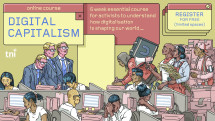Digital Capitalism 6 week essential course for activists to understand how digitalisation is shaping our world
Topics
This collection of materials is drawn from a dynamic six-week course that delved into the concept of digital capitalism — what it is, how it is being shaped, and its far-reaching impacts on our economy, society, and environment. While the initial enrollment period for the course has closed, we are pleased to provide these materials as a resource for continued learning and reflection. Whether you're exploring this topic for the first time or seeking to deepen your understanding, you can use this repository to access insights, lectures, and discussions from leading experts on critical aspects of digital capitalism.

Downloads
-
Digital Capitalism week 1: What is Digital Capitalism? (PDF, 3.01 MB)Average time to read: 30 minutes
-
Digital Capitalism week 2: Big Tech and the Digital Overlords (PDF, 1.58 MB)Average time to read: 30 minutes
-
Digital Capitalism week 3: Digital colonialism - Geopolitics of data and development (PDF, 1.56 MB)Average time to read: 30 minutes
-
Digital Capitalism week 4: The digital trade agenda (PDF, 1.48 MB)Average time to read: 30 minutes
-
Digital Capitalism week 5: Digitalisation and the security state (PDF, 1.41 MB)Average time to read: 30 minutes
-
Digital Capitalism week 6: What’s the alternative? The digital world we want to live in (PDF, 1.56 MB)Average time to read: 30 minutes
Authors
1: What is digital capitalism?
How is digitalisation shaped by capitalism and how is digitalisation shaping capitalism? Is data today’s most important commodity? What will be the impact of algorithms for social movements? How is digitalisation impacting on labour and the environment?
Masterclass with Cory Doctorow, science fiction novelist, journalist and technology activist.and co-author of Chokepoint Capitalism, Gurumurthy Kasinathan, director of IT for Change and coordinator of 'Public AI for School Education' project in Kerala,India, and Sofia Scasserra, TNI researcher on digital trade and digital advisor to the international trade union movement.
2: Big Tech and the Digital Overlords
How did a few digital companies become so powerful? How do they differ to other non-digital corporations? What is the source of their power, finance and influence? How successful have regulatory attempts been to limit their power? How can we effectively rein them in?
Masterclass with Margarida Silva, researcher on Big Tech at the Centre for Research on Multinational Corporations (SOMO), Cecilia Rikap, Associate professor in Economics at Institute for Innovation and Public Purpose (IIPP) UCL and author of ‘Capitalism, Power and Innovation: Intellectual Monopoly Capitalism uncovered’ (Routledge 2021), and James Schneider, co-convenor with Uni Global Union of the Make Amazon Pay coalition.
3: Digital colonialism - Geopolitics of data and development
How has digitalisation perpetuated global inequality? Who benefits and loses from global value chains? How is the internet and data management governed globally? What are the strategies of the major state digital powers - US, China and Europe – and where does that leave everyone else?
Masterclass with Ulises Mejias, Professor of Communication Studies at SUNY Oswego, co-founder of the Non-Aligned Technologies Movement and co-author of ‘Data Grab: The new Colonialism of Big Tech and how to fight back’ (Penguin 2024), Paola Ricuarte, Associate professor in the Department of Media and Digital Culture at Tecnológico de Monterrey, co-founder of Tierra Común, dedicated to decolonising data, and regional coordinator of the Feminist AI Research Network, and Nandini Chami deputy director of IT for Change and researcher on digital rights and development, and the political economy of women’s rights in the information society.
4: The digital trade agenda
How are Big Tech trying to solidify their control of data? What are the big trade battles that are emerging? How do proposed digital trade rules hinder meeting basic needs and protecting the environment? What could a development-based digital trade agenda look like?
Masterclass with Deborah James, Director of International Programs at the Center for Economic and Policy Research and coordinator of the global Our World Is Not for Sale (OWINFS) network, Vahini Naidu, Programme Coordinator of the Trade for Development Programme (TDP) of the South Centre and former international trade negotiator for South Africa, and Kristina Irion, Associate Professor at the Institute for Information Law (IViR) at the University of Amsterdam and researcher on the governance of transnational digital technologies and global data value chains.
5: Digitalisation and the Security State
How is digitalisation being used by state systems of repression and control? Who is most impacted? What protections exist in liberal democratic regimes to protect civil liberties and what are their limitations? What examples exist of successful resistance against state digital surveillance?
Masterclass with Ben Hayes, TNI Associate, director of AWO, a ‘data rights agency’ and long-time researcher on international security, counterterrorism, surveillance, human rights, civil liberties and civic space, Marwa Fatafta, researcher and activist on the digital occupation in Palestine,and Petra Molnar, lawyer and anthropologist, co-creator of the Migration and Technology Monitor and author of ‘The Walls Have Eyes: Surviving Migration in The Age of Artificial Intelligence’ (The New Press 2024).
6: What's the alternative? The digital world we want to live in
How are social movements resisting Big Tech? What are the values, principles and foundations of alternatives based on social and environmental justice? What models exist already? What infrastructures, policies and models for digital justice need to be created?
Masterclass with Ekaitz Cancela, journalist on technology and capitalism and author of Despertar del sueño tecnológico ( 2019) (in English ‘Awaking the Technological dream’), Anita Gurumurthy director of IT for Change where she leads research and advocacy on data and AI governance, platform regulation, and feminist frameworks on digital justice and Leandro Monk, founder of gcoop and pioneer of Free and Open Source Software and cooperative platforms in Argentina.

